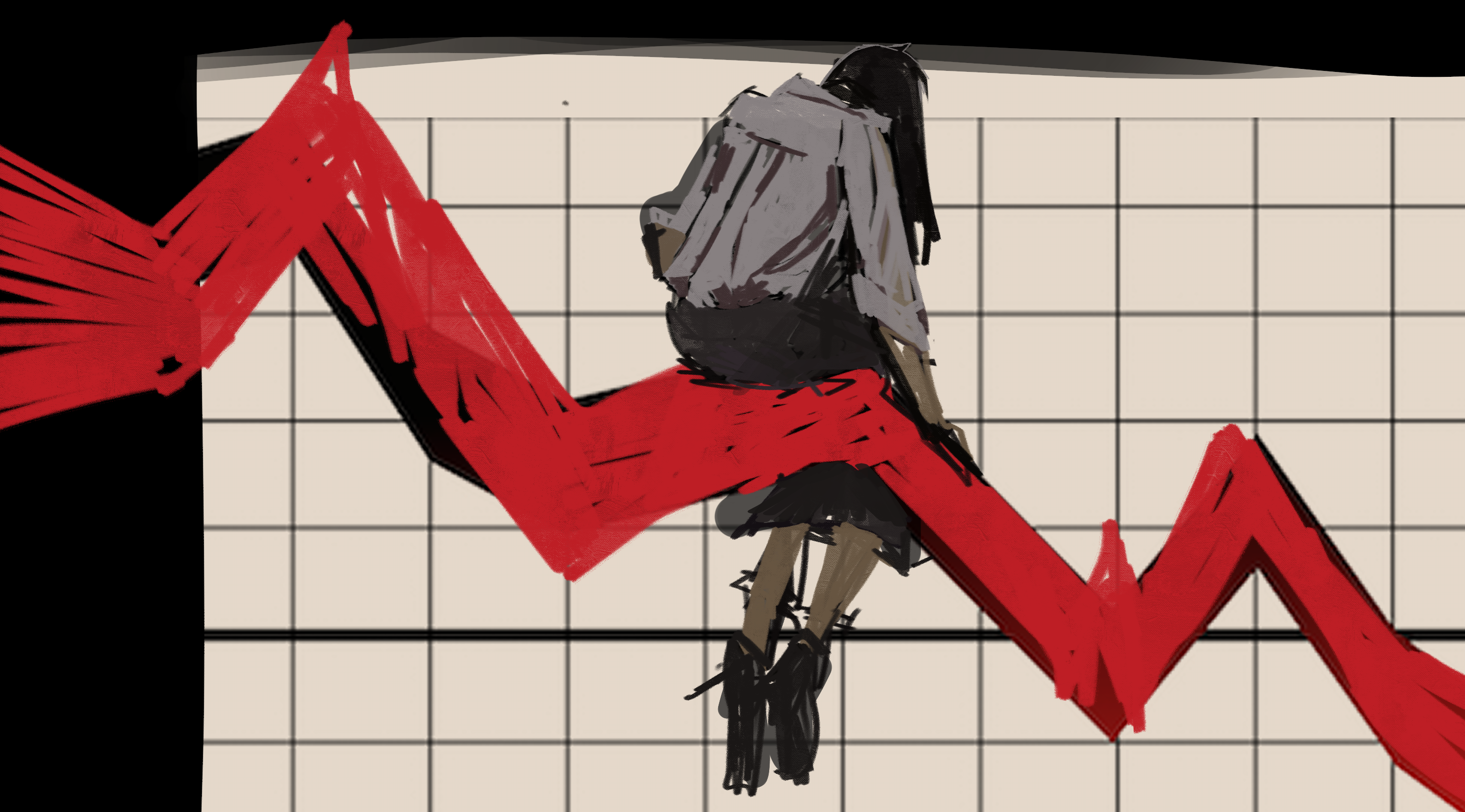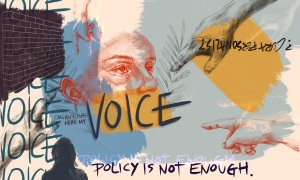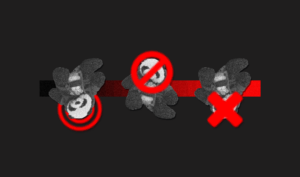For decades, eager freshmen have arrived on the Hilltop in the sweltering heat of August and immediately donned their business professional attire to find their place on campus—before they even had their class schedules memorized. However, a controversial McDonough School of Business Student Advisory Board (MSAB) policy implemented in Fall 2023 has meant that, for now, the business clubs’ competitive application craze is postponed to January.
After conducting surveys about students’ well-being and sense of belonging on campus, McDonough School of Business (MSB) leadership realized community and inclusivity were pressing issues, and partially attributable to rigorous and exclusive MSB club culture. Effective fall of 2023, MSAB established a new rule following guidance from MSB leadership that all student organizations receiving MSAB funding must have an “open access” period to align with Georgetown’s pillar of commitment to inclusivity on campus.
The new policy mandates that club membership must be nondiscriminatory and open to the entire undergraduate population. As a result, first year students are barred from joining MSB clubs as formal members in their freshman fall and must wait until spring to apply for official membership.
Until then, students can participate as “open access” members, attending public events instead of formally joining the club. In practice, this means that clubs must have programming like education sessions or community events for students interested in the organization who are not applied members.
According to MSAB, the goal of the policy is to create opportunities for freshmen to find community without the pressure of applying to and being rejected from clubs just weeks into their first semester on the Hilltop. However, a year and a half later, the community is torn on whether the MSAB has achieved these goals.
The MSAB board is composed of students under the direction of the McDonough School of Business Undergraduate Program Office (MSBUPO) and the Council of Advisory Boards to align with goals of the MSB deans and university policies while still having student representation.
“It’s important to know what we do and what we don’t do,” Toni Marz (MSB ’26), current president of MSAB, wrote in a statement to the Voice. “A significant part of our work involves ensuring that our business school clubs comply with the Georgetown Access to Benefits policy.”
While this policy appears inclusive on the surface, many MSAB club leaders have found that it has hindered their professional work and members’ growth.
Yugo Kuga (SFS ’26), the Chief Investment Officer of Zeeba Investment Group, highlights that the recruiting timeline for students looking for jobs in the finance and banking industries will not wait for Georgetown students who started a semester late.
“The industry is recruiting kids earlier and earlier, and Georgetown kids are pushed back,” Kuga said.
Haroon Naz (MSB ’26), co-president of Theta Investment Group (TIG), agrees with Kuga. He highlighted that automatically missing a semester of learning as an applied member means that critical time is lost in the short recruiting cycle for finance jobs. Naz’s graduating class was the last to recruit before this MSAB policy, and he’s noticed a clear distinction from then to now.
“It is so much harder for kids to gather what they need to build themselves up and find mentors for the process,” he said. “Kids are just so much less prepared.”
Naz also emphasized the fact that despite the policy, application cycles are not any less competitive—the rejection is just pushed back a semester. In fact, club leaders have reported an increase in applications due to the application season getting pushed back a full semester, ultimately making the process more competitive and exclusive.
“We have seen a strong increase in the competitive nature of honestly, any MSB club,” Kendall Beil (MSB ’26) the CEO of Georgetown Ventures, said.
Kuga stressed that with increased applicants due to open access, it is impossible to accommodate everyone who has devoted a semester of time in the club. Close to 130 freshmen are still involved in open access by the end of the semester, but Zeeba cannot accept all of them.
“Kids are always going to get rejected. It’s a rat race,” he said.
In response, MSAB told the Voice that it recognizes the hard work clubs are putting in to meet this increased demand.
“Some have been overwhelmed by the number of students, and we understand why,” Marz wrote. “We continue to advocate and provide feedback to the dean’s office, who in the end directly oversee the policies.”
The delayed application process has only put a stronger emphasis on getting into clubs, Beil said, leading students to apply to upwards of five MSB clubs hoping to get into at least one. With increased time and effort going into applications, Beil wonders whether the policy is actually decreasing stress and promoting inclusivity.
“The new process is significantly more daunting for freshmen,” she said.
Marz emphasized that while MSAB acknowledges there have been bumps in the road, it has been working through these kinks while keeping the administration’s goals and students’ wellbeing in mind.
“We are continually evolving and listening to our clubs, the students, and the administration,” Marz said.
Club leaders aren’t the only ones frustrated with the policy—prospective members also see flaws, even though the policy is intended for their benefit.
Eager to find a community on campus right away, Grace Keeley (MSB ’28) joined the Georgetown University Alumni and Student Federal Credit Union, Georgetown Eating Society, and the competitive ski racing team during her freshman fall, none of which are MSAB clubs.
“Coming in, I knew I wanted to apply to [Georgetown] Ventures,” Keeley said. “But I knew I had to wait.”
She talked about how being in clubs first semester prepared her for the more intense application cycle that would come in the spring with the MSB clubs.
“I was really lucky to get into Ventures,” said Keeley, “I mean, I kind of put all my eggs in one basket, but I guess it worked out.”
Because Keeley already had the validation and support of her first semester non-MSB club communities, she felt less pressure come the spring. However, some students who prioritized MSAB clubs had a different experience. Erik Olmen (MSB ’27) was a part of eight open access programs his freshman fall, and still felt a lack of belonging.
“Your freshman fall is when you build your foundational community,” Olmen said (MSB ’27). “I didn’t feel like any of them really cared about me.”
Like Olmen, Keeley said that many of her freshmen friends applied to as many MSB clubs as possible in the spring hoping they would be accepted into at least one—regardless of what the club was.
“It is tricky because at that point, are you actually applying to something you are interested in, or are you just throwing all your darts at a board and hoping something sticks?” she said.
MSAB, however, sees increased participation as a positive, reporting that over 1000 freshmen participated in different open access programs.
“This is exactly what we wanted,” Marz wrote, “This provided many students with access to essential education and training, socialization, and shareable resources.”
Despite increased participation, the quality and community of open access programs differs from club to club.
Zeeba Investment Group has a comprehensive education program to make sure their potential future members do not fall behind on essential preparation for club work and finance recruiting. Once a week, Zeeba hosts a session for general members where they meet with their cohort and gain skills and advice from assigned mentors.
“It is a very extensive process,” Kuga said. “I can confidently say that we put in more than any other MSB club.”
Other club leaders admit that their open access programs are not a priority.
“We are really busy with the professional part of our club,” Naz said. “And we are students too, with classes and other clubs, so it’s on the back burner for sure.”
As a result, many clubs default to doing a few open access events a semester, just enough to meet the MSAB requirements.
Students generally agree with MSAB’s efforts to be more inclusive, but say the current open access policy is fundamentally flawed. Olmen suggests that freshmen should be able to apply to clubs in the fall so they can get the full community experience as early as possible, especially at a vulnerable time as new students at Georgetown. If they get rejected, he says that then they should be able to do open access with more intention and gain knowledge about the industry for when they apply again.
“The clubs and communities that become central to their college careers are the ones where they can be full-fledged members their freshman fall,” Olmen said.
Olmen told the Voice he thinks that this policy hurts the MSB community as a whole because freshmen cannot find community early on, and that it is extra competitive when they do try in the spring.
However, Naz thinks that there is no good solution to the competitiveness of Georgetown’s clubs. Naz feels the policy tries to protect kids from failure as if it is a bad thing or even preventable, but the job market beyond Georgetown is inherently competitive—and students should be prepared.
“It is just the nature of life,” Naz said. “They are not waiting for you to settle in. It is not going to be easy.”






